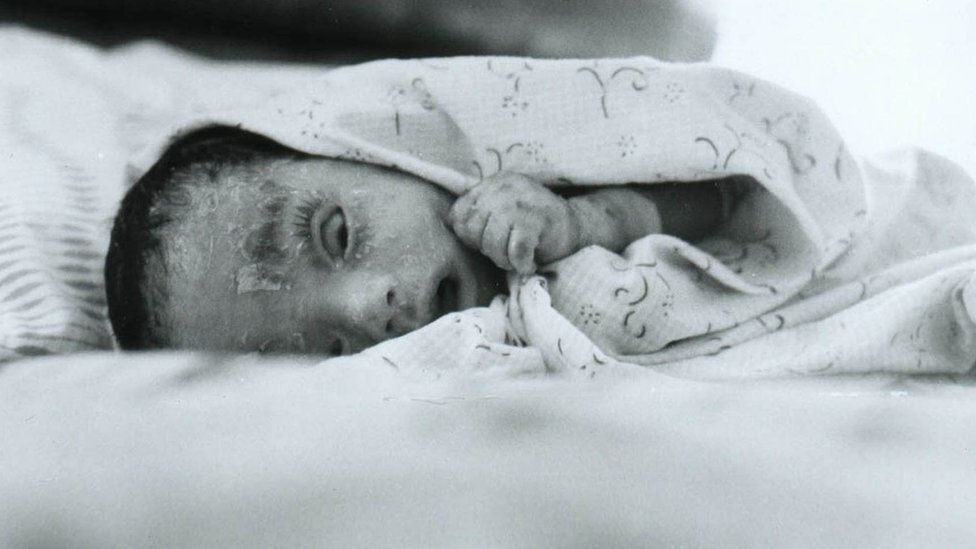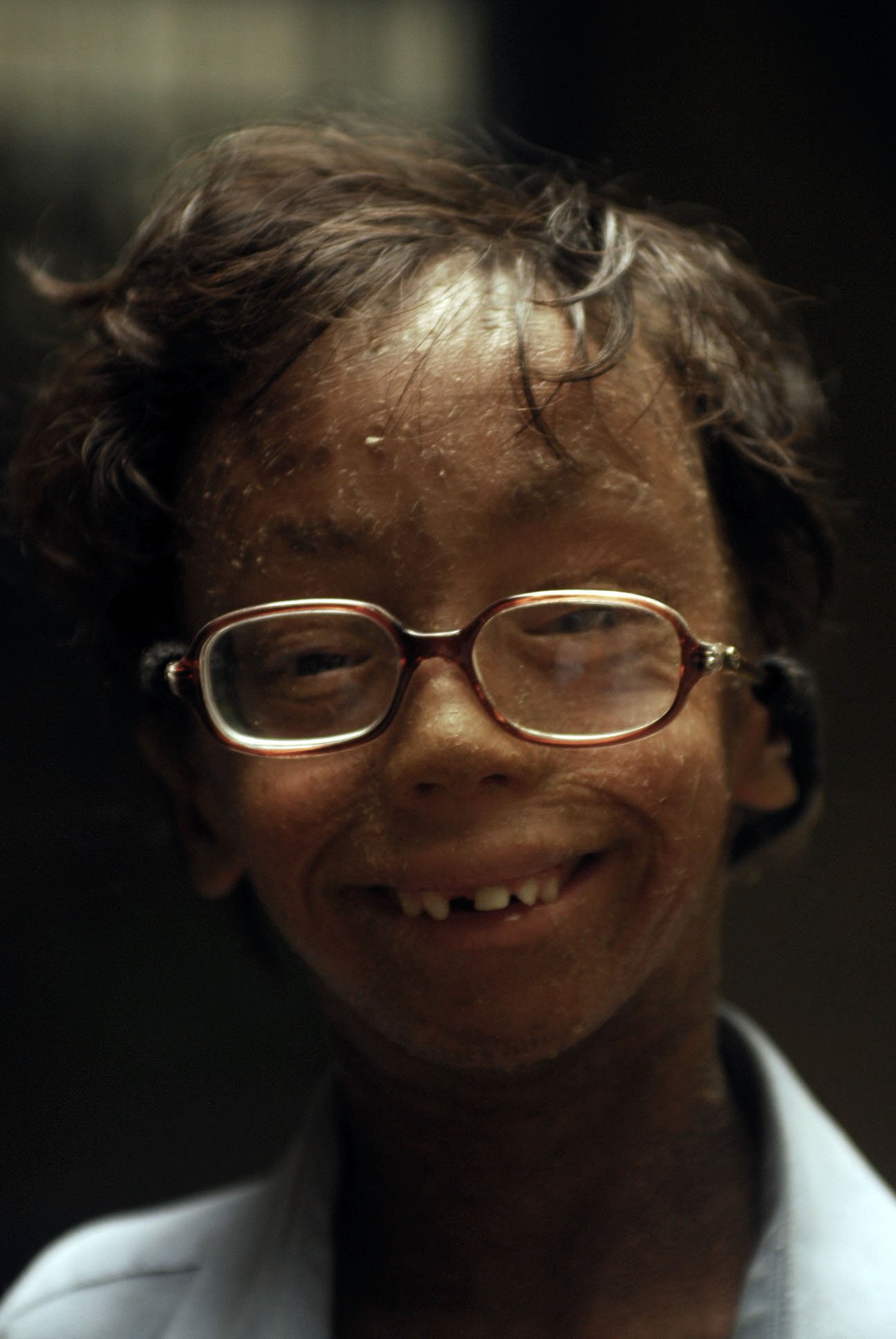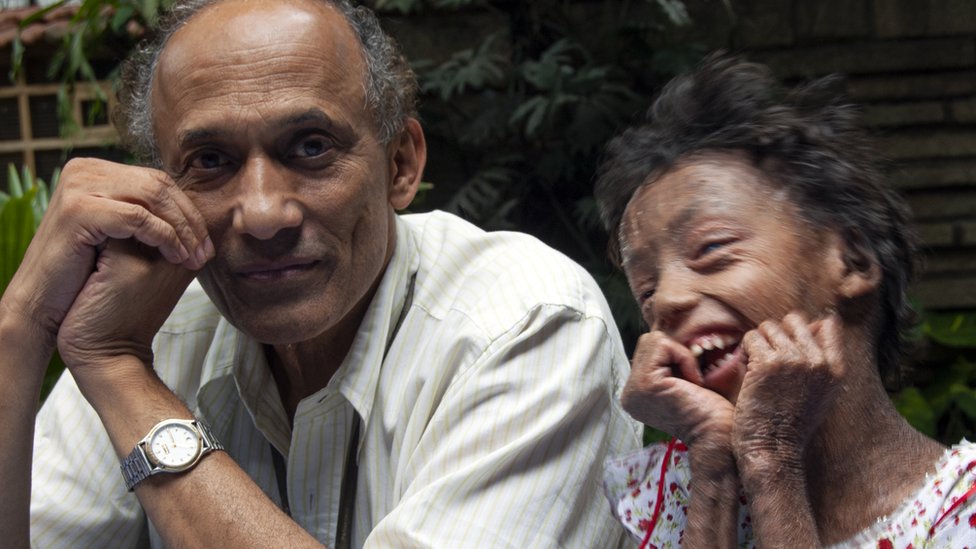One day in Bengaluru, 19 years ago, Aloma Lobo met Nisha for the first time.
Aloma was a doctor and often visited the orphanage where Nisha had been left by her birth parents. Nisha didn’t look like other babies in the orphanage. She had no eyelids and her skin was very dry, due to a very rare genetic disorder. When people came to the orphanage looking for a child to adopt, they never chose Nisha.
“That very first moment when we set our eyes on Nisha was a shock. To see a child who was so badly disfigured,” says Aloma.

</figure><p>But after their initial surprise at seeing a baby with bleeding eyes and peeling skin, Aloma and her husband David saw beyond Nisha's condition, and instead saw a child in desperate need of love.
“She was so tiny, so vulnerable, abandoned, given away, and rejected. That was the time when she needed her family the most, when she needed someone to hold her, to hug her.” Aloma says.
“Our second daughter, just picked her up, hugged her and said ‘mum, let’s take her home’ – and that’s exactly what we did,” says Aloma.

</figure><p>Nisha's condition is known as Lamellar Ichthyosis and as she describes it, 'it means she has skin like that of a fish. It is scaly and sheds constantly.'
لیمرل اکتھائوسز
She might look different but she considers herself to be living an incredibly full life today. The fact that she was never treated differently by her brothers and sisters has probably helped her overcome and doubts she might have about her ability to get ahead in life.
“When I was younger, my second oldest brother was the one I used to fight with, He used to wrap me up in a carpet and then stand the carpet in the corner so I couldn’t move.”
When it came to starting school, Nisha faced a new wave of mixed reactions – a lot of staring, which was now par for the course – and being told there were certain things she couldn’t do, such as sports.
“I couldn’t do it didn’t mean I didn’t end up doing it,” says Nisha.
“My friends were crazy about sports, so I did end up running and I built up an endurance. It’s painful at times when my skin cracks, but I’ve lived with that my whole life and so it’s something you get used to after a while.”
She will soon turn 20 and is currently pursuing Business studies at a college in Bangalore. She aspires to be a teacher. She doesn’t see herself as any different from others.
Nisha tells me matter-of-factly about some of the incidents which have become common throughout her life. She remembers when she was on a flight with her mother and a passenger refused to sit next to her, even asking for her to be taken off the plane.
“They [the airline] offered to move us up to business class as an apology, but that’s when I told my mum no, we don’t need compensation for someone else’s poor behaviour,” says Nisha.
She says when people stare at her or when someone is unkind to her she prefers to react with a wave – not confrontation. “I don’t get upset. I only get upset if I choose to be.”
Her positivity is kind of humbling when you find that she has had to contend with mindless cruelty throughout her life. There was once a lady who met Nisha at the church when Nisha was just four-years-old.
“She touched her face and she said, ‘I don’t know you, but your ancestors must have done something terribly wrong for your daughter to be like this’. I felt like kicking her in the shin,” says Aloma.
But Aloma says her temper was tamed by her young daughter. “She looked at me with such an innocent face, and so I said to the woman ‘thank you very much’ and walked away.”
—

</figure><p>It's estimated 2.1 per cent of the India's population have some form of disability - which is around 26 million people.
For many years, many disabilities were not even recognised by the government but in 2016, after years of advocacy by disability rights activists, the Indian parliament expanded the number of recognised disabilities covered under law from 7 to 21.
The move by parliament was an incredibly empowering step for a country that remains largely uniformed about disability-related matters.
Stigma, prejudice, and misconceptions around disability still exist in the country.
Nisha says she wants to fight this prejudice. She has appeared on a TV chat show and, despite her aversion to public speaking, she even gave a TedX speech.
“In India there is a stigma attached to genetic conditions, families are shunned, mothers are blamed, children are ignored or hidden,” Nisha says.
“Often if a doctor finds out [that an unborn baby has a genetic condition] he advises pregnancy be terminated as if these children don’t have a right on Earth.
“My birth parents had relinquished me when I was one week old, three weeks later I was adopted by my parents into their home and heart.”
Today Nisha is a happy young woman, studying in college, and hopes one day to become a teacher – though her father David says she already is one.
“I think she has made the biggest impression on my life. She’s the person I find who doesn’t react. She always is in charge of her situation. We react to weather, to traffic, we’re upset when it’s cold, when it’s hot, when it’s raining, but not her, she’s happy all the time”, David says.
“If you look at her pictures, she’s always smiling. There is like a lifetime of happiness in her smile. I find her to be a wonderful teacher – I’ve learnt a lot from her.”
Nisha is typically philosophical in her response.
“I think happiness is a mind-set, not just an emotion, my skin condition is like a part of me, and it’s not everything. I can decide to be happy, or I can decide to be sad.”
FACT BOX
WHAT IS LAMELLAR ICHTHYOSIS?
•It is a rare inherited skin disorder affecting around 1 in 600,000 people.
•It is characterised by dry, cracked and scaling skin.
•Infants with the condition are often born with a sheath covering their skin. This peels off after a few weeks, to reveal their scaly skin. They may also have eyelids and lips that are turned outward.
•People affected by the condition are vulnerable to infections and hair loss and a decreased ability to sweat, which makes them more sensitive to heat.
•There is no cure for Ichthyosis, but it can be helped with moisturisers and eye drops.
•It is not contagious.









